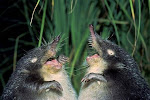
Frustrating traffic jams could become a thing of the past thanks to the humble ant.
The planet's most intelligent insect is far more adept at managing congestion than humans, say scientists. This helps them move around their colony much more efficiently and why you never see the tiny creatures backed up in queues.
Ants have brains that contain about 250,000 cells - the largest among insects, according to collective intelligence expert Dr Dirk Helbing. He believes his ant study could hold the key to solving the bane of road congestion.















